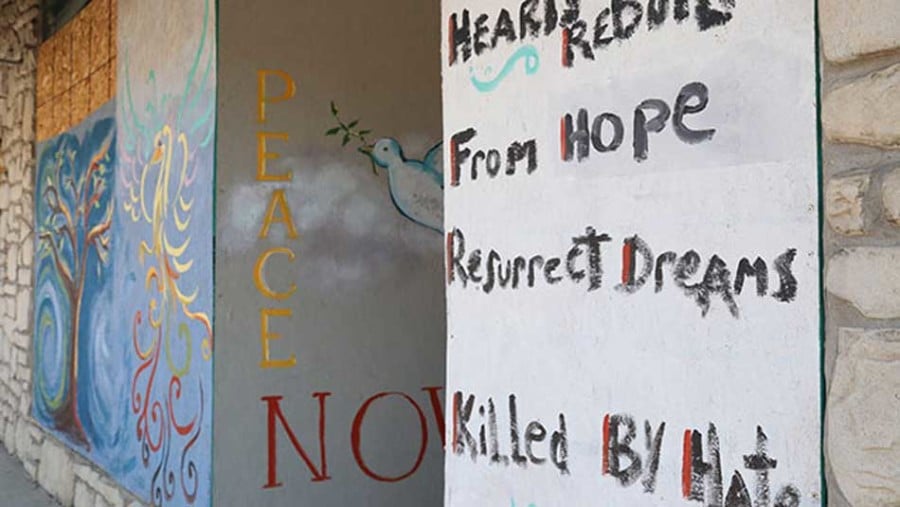NU-Q students study race, media in Ferguson
Painted messages cover boarded up windows in Ferguson, Missouri, a year after the city erupted following the police shooting of Michael Brown. Prof. Amy Sanders and seven students from NU-Q traveled to Ferguson this summer to study the issues of media coverage and race following the shooting.
October 5, 2015
Sitting in the Lambert-St. Louis International Airport a little over a year ago, Amy Sanders waited for a flight that would take her more than 7,000 miles away from her friends and family. But even after landing in Doha for the start of the academic year as an associate professor at Northwestern’s Qatar campus, Sanders’ attention was drawn back to the United States as she watched the city of Ferguson, Missouri, erupt after the police shooting of a young, unarmed black man named Michael Brown.
Captivated by — as well as critical of — the media attention fixated on the small municipality of Ferguson, Sanders said she saw a real-world opportunity for her students to engage with how the media portrays the news. She wanted her students to experience St. Louis through her eyes as an American and to understand the power of media coverage in impacting the lives of individuals, she said.
“Taking the students to Ferguson forced them to stretch their creative wings,” she wrote in an email to The Daily. “They had no choice at times but to be independent, on-the-spot problem-solvers.”
The students toured Ferguson, meeting with community members, local media and city officials, including open access to the mayor of Ferguson. Seven students, representing Lebanon, Jordan, India, Singapore, China and South Korea, comprised the class for the four-week intensive course, half of which was spent in Doha and half in Ferguson.
Sanders credited her personal connections to the region for timely access to important city figures like the mayor, who survived a recall petition to remove him from office while students were in Ferguson. However, she also emphasized the importance of exposing students to the frustrations of the broader community.
“It wasn’t enough for them to simply meet with ‘official’ voices — spokespeople and newsmakers alone,” Sanders said. “They needed to meet the citizens of Ferguson, experience the community and understand what it’s like to live in St. Louis, even if just for two weeks.”
Sanders said St. Louis’ past and location within the U.S. gives it a unique socio-political climate, which she thought would provide a valuable experience her students even though St. Louis lacks the “glamor” of cities like Chicago and New York. Being able to tour Ferguson and witness the impact, from boarded up storefront windows to street art bearing messages of hope, was the best way to understand how the media “missed the mark” with their coverage, she said.
Although the class provided a chance for the students to analyze media coverage in real-time, the class also arose from her own anger and frustration with the portrayal of her home, Sanders said.
“I felt a sense of helplessness that I can’t begin to describe, but it was quickly replaced by anger at how St. Louis was being portrayed in the national and international media,” she said. “In part, I suspect I developed the class to help myself make sense of what was happening and to process how I was feeling.”
Jueun Choi, a sophomore from South Korea studying journalism at NU-Q, had never been to the United States before Sanders’ class.
Choi said the class taught her about the need for critical reading of breaking news stories, as she realized media organizations are prone to make mistakes when they prioritize speed. The class also gave her a sense of responsibility for the people and communities she reports on, especially in providing the proper context to ensure accurate portrayals.
“It was a creative idea to use the Ferguson incident to expose some of our Middle Eastern students to a pervasive American social problem in a thoughtful context,” said NU-Q Dean Everette Dennis in a news release this August. “They often think America is perfect or terrible; they don’t have much depth of knowledge about problems like race in the U.S.”
Sanders noted that for many, witnessing that “discrimination was alive and well in the U.S.” as students of color was surprising, and that the class opened their eyes to the social problems the U.S. faces.
For Choi, in this sense the class was a success.
“Racial issues are extremely complicated and go back into the past,” she wrote in an email to The Daily. “The state of racial issues in the U.S. cannot be defined simply.”
Email: [email protected]
Twitter: @dagerber


